
Develop language skills and cultural knowledge essential for a career in the francophone world
Affaires globales' broad scope of disciplines and cultural content will appeal to students interested in a wide variety of careers while giving them the skills needed to pursue them. This intermediate-high to advanced-level French textbook is designed for French for specific purposes courses such as business or professional French and can be used as a main text for one semester or adapted for two semesters of use.
Affaires globales uses an interdisciplinary multiliteracies approach to help students develop the cultural knowledge and language skills necessary to pursue a career in the francophone world. Over the textbook's seven units, Affaires globales weaves in contemporary themes such as entrepreneurship, sustainable development, and global engagement with discussions of tourism, business, marketing, fashion, diplomacy, environmental studies, and global health. Lessons incorporate authentic materials from across the francophone world, from France to Quebec to sub-Saharan Africa.
Features:
A wide selection of activities—true or false, fill in the blank, multiple choice, and open-ended questions— allow students to engage with course material in varied ways
Chapter activities contribute to a semester-long project that helps students evaluate their career goals and reflect on their growth throughout the course
Free access to authentic multimedia resources and instructors' materials

Lorraine López (author of Soy la Avon Lady and Other Stories) has created a vivid picture of barrio life, filled with honesty, insight, and humor for young adults. She paints a balanced and detailed landscape of Enrique's world. Although Enrique is confused and angered by his mother's refusal to stand up for him against the abuse of his stepfather, he also draws strength from the supportive and loving family of his friend Francisco. While some of his teachers are uncaring or inept, others provide help and encouragement at critical moments in his life.
When Enrique witnesses his friend Horacio gunned down in a drive-by shooting and is seen by the assailants, gang members set out to kill him. As the novel reaches its climax, Enrique must make some agonizing decisions.
Although specifically about barrio life, this novel is universal in its themes—the drive for success, the desire for love and family support, and the need for true friendship. López's fully delineated characters provide a rich and credible mural of our human comedy.

C'est ce qu'on dit with Website is a second-year (intermediate-level) companion textbook to the beginning-level textbook Comme on dit, and as such follows the same basic format and principles: students work with hundreds of samples of authentic, nonscripted spoken and written French and are led in a step-by-step manner from rule discovery to the acquisition of speaking, reading, writing, and listening competence. The homework activities and inductive presentation of grammar guarantee a completely student-centered approach, as student input is required in each and every exercise. Given the more advanced focus of C'est ce qu'on dit, exercises lead students to expand their competence not just with conversational registers but with formal written and spoken registers, as well. The accompanying companion website–included with the book–offers audio and fully integrated exercises to use alongside the text.
Programs that take advantage of the full range of speaking, listening, reading, writing, grammar, and cultural expansion activities in C'est ce qu'on dit will find it to be a robust standalone program; however, in the event that programs prefer to include an outside content component, suggestions are offered in the preface and throughout each unit for ways to free up classroom time. By the end of C'est ce qu'on dit, an average student can be expected to have attained the competency objectives described as Advanced-Low on the ACTFL proficiency scale and as a B1 level on the Common European Framework scale (CEFR).
To aid instructors in effectively implementing this distinctive approach, the Teacher's Edition textbook comes with answers for all activities, plus teaching notes in the margins and extensive ancillary resources online.
For Instructors: Please submit print exam and desk copy requests for the Teacher’s Edition using ISBN 978-1-64712-213-3. The Teacher’s Edition includes answers for all activities, plus teaching notes in the margins.

E-Textbooks are now available to purchase or rent through VitalSource.com! Please visit VitalSource for more information on pricing and availability.
As of January 1, 2021, the Smart Sparrow Companion Websites are no longer available. Soon, we will announce a new set of companion websites. Demos for the new companion websites will be available for instructors to sample beginning in spring 2021. The complete websites will be ready in time for students to use them during the fall 2021 semester.
Until the new companion websites become available, eBook Workbooks with exercises from the Smart Sparrow Electronic Workbook are available for purchase on the GUP website and VitalSource.com, as are Workbook Answer Keys. They will both be sold in eBook format only.
Comme on dit, a comprehensive first-year French textbook program, engages students in the learning process from day one using an inductive methodology centered on guided observation and rule discovery. Together with students’ communicative needs and an analysis of their most pervasive transfer errors from English, the everyday speech patterns of 100 native speakers—culled from 150 hours of unscripted recordings—form the linguistic backbone of the method. Using a workbook format, students examine, compare, and contrast this wide variety of authentic discourse to discover both individual and shared language use and cultural perspectives. Additionally, students systematically and progressively acquire the fundamental sounds and rhythmic patterns of spoken French, which leads them to develop solid pronunciation and conversational fluency as well as notable listening comprehension skills. To aid instructors in effectively implementing this distinctive approach, the Teacher’s Edition textbook comes with answers for all activities, plus teaching notes in the margins and extensive ancillary resources online. By the end of one academic year, students with no prior French instruction can expect to achieve Intermediate-Mid to Intermediate-High proficiency on the ACTFL scale.
Features of Comme on dit:
• Emphasis on providing students with the tools and skills to help them communicate early on about topics relevant to them and their daily lives• Equal focus on all four major skill areas—reading, writing, listening, and speaking—and on the establishment of a solid grammatical and lexical foundation• Over 1,000 audio and video files, giving students ample material to practice listening to French as it is spoken by native speakers• Over 250 snippets of written authentic discourse, ranging from book titles to proverbs• Teacher’s Edition textbook with answers for all activities, plus teaching notes in the margins• Extensive ancillary instructor’s resources, including an instructor’s manual, quizzes, sample midterm and final exams, available at CommeOnDitTextbook.com
For Instructors: To sample the eTextbook, please visit VitalSource.com to create an account. After you login, you may request a free copy by clicking on "Faculty Sampling" in the upper right-hand corner, searching for the "Digital Exam Copy," and selecting "Request Sample".

Comme on dit with website, a comprehensive first-year French textbook program, engages students in the learning process from day one using an inductive methodology centered on guided observation and rule discovery. Together with students' communicative needs and an analysis of their most pervasive transfer errors from English, the everyday speech patterns of 100 native speakers—culled from 150 hours of unscripted recordings—form the linguistic backbone of the method. The accompanying companion website–included with the book–offers audio and fully integrated exercises to use alongside the text.
Students examine, compare, and contrast this wide variety of authentic discourse to discover both individual and shared language use and cultural perspectives. Additionally, students systematically and progressively acquire the fundamental sounds and rhythmic patterns of spoken French, which leads them to develop solid pronunciation and conversational fluency as well as notable listening comprehension skills. By the end of one academic year, students with no prior French instruction can expect to achieve Intermediate-Mid to Intermediate-High proficiency on the ACTFL scale.
To aid instructors in effectively implementing this distinctive approach, the Teacher's Edition textbook comes with answers for all activities, plus teaching notes in the margins and extensive ancillary resources online.
Features
• Emphasis on providing students with the tools and skills to help them communicate early on about topics relevant to them and their daily lives
• Equal focus on all four major skill areas—reading, writing, listening, and speaking—and on the establishment of a solid grammatical and lexical foundation
• Over 1,000 audio and video files, giving students ample material to practice listening to French as it is spoken by native speakers
• Over 250 snippets of written authentic discourse, ranging from book titles to proverbs
For Instructors: Please submit print exam and desk copy requests for the Teacher’s Edition using ISBN 978-1-64712-212-6. The Teacher’s Edition includes answers for all activities, plus teaching notes in the margins.
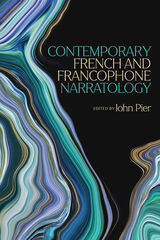
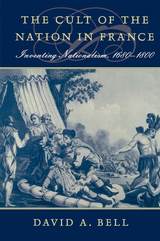
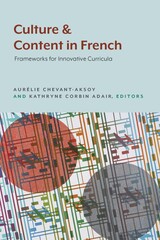
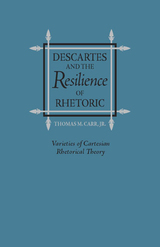
A careful analysis of the rhetorical thought of René Descartes and of a distinguished group of post-Cartesians. Covering a unique range of authors, including Bernard Lamy and Nicolas Malebranche, Carr attacks the idea, which has become commonplace in contemporary criticism, that the Cartesian system is incompatible with rhetoric.
Carr analyzes the writings of Balzac, the Port-Royalists Arnauld and Nicole, Malebranche, and Lamy, exploring the evolution of Descartes’ thought into their different theories of rhetoric. He constructs his arguments, probing each author’s writings on rhetoric, persuasion, and attention, to demonstrate the basis for rhetorical thought present in Descartes’ theory of persuasion when it is combined with his psychophysiology of attention.
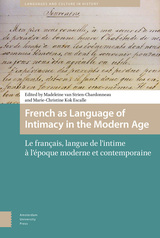
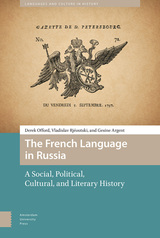
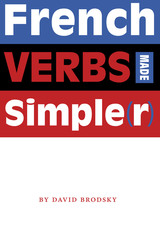
It's time for a new approach to learning French verbs. Unlike popular verb guides that require the rote memorization of hundreds of verb forms, this book clearly explains the rules that govern the conjugation of all classes of French verbs—especially the irregular ones that give second-language learners the most trouble. These straightforward, easy-to-understand rules for conjugating French verbs are effective learning tools for both beginning students and more advanced speakers who want to perfect their usage of French verb forms.
French Verbs Made Simple(r) has many helpful features that you won't find in any other verb guide:
- Clear explanations of all verb tenses and forms.
- The simple patterns and rules that govern the conjugation of all verbs—including those verbs whose irregularities follow patterns that can be easily learned.
- A detailed discussion of how each verb form is used, with numerous examples.
- A full explanation of whether a verb should be conjugated with avoir or être, and the conditions under which the past participle is variable—two of the thorniest problems for students of French.
- An extended treatment of the subjunctive that will help you understand why it is used in some situations but not others.
- Complete conjugations for 57 basic model verbs (along with 27 "variants") and a comprehensive listing of some 6,200 verbs that indicates which of the models each verb follows.
Going well beyond any other guide in the clarity and detail of its explanations—as well as the innovative manner in which individual verbs are linked to model conjugations—French Verbs Made Simple(r) is the only guide to French verbs a learner needs.
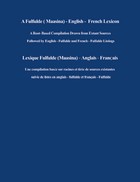
The Lexicon brings together lexical material from a wide range of published and non-published sources to create an extensive compilation of the vocabulary of Fulfulde as it is spoken in that part of central Mali known as Masina (in Fulfulde, Maasina). The Lexicon is intended primarily for non-Fulfulde speakers who are learning the language at the intermediate or advanced levels and who need access to a comprehensive reference source on Fulfulde vocabulary. Scholars, development workers, and others whose research or fieldwork involves use of the Fulfulde of Masina may find it helpful as well in clarifying nuances of meaning and standardized spelling for the less familiar terms they might encounter. It is also intended that the present work, beyond the matter of organizing vocabulary, will contribute significantly to the expanding lexicographical and linguistic investigations of Fulfulde.
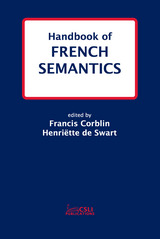

This "new France" is a country poised to experience the European single currency but uncertain about being part of Europe. It is hooked on fast food but ambivalent about the country where it originated. France today has record unemployment and an increasingly controversial immigrant population. Clearly, given the rapidly changing conditions and lifestyles, conventional French dictionaries alone cannot completely inform readers and visitors. Insiders' French offers a solution to the incomprehension, a unique handbook in which you'll find the language of European union, the space program, abortion and women's rights, high-tech industries, and health care, among other topics. Entries proceed by association of ideas and related terms, with extensive cross-referencing, while still being alphabetized for easy reference like a standard dictionary. Cartoons from major French journals add to your understanding and enjoyment.
Insiders' French opens up the secret territory of French politics and culture that is often not understood by visitors or students, and it does so with wit and verve—qualities that remain in the French language despite its recent changes.

Je me souviens invites post-intermediate students of French to improve their language skills while exploring the complex history and culture of Québec.
Drawing on cultural products from the earliest days of exploration to the present day, Elizabeth Blood and J.Vincent H. Morrissette curate an array of texts that sample Québécois literature, popular culture, art, music, and politics and frame the texts with pre-reading and post-reading activities, cultural notes, and historical overview sections. The interdisciplinary approach challenges students to improve their French language skills while learning about Québec. Thematically organized writings delve into issues central to understanding the many facets of contemporary Québécois identity, while prompts direct students to search for a range of materials online. Je me souviens is an essential resource for students interested in understanding the francophone world.

Learning French from Spanish and Spanish from French provides adult English speakers who have learned either Spanish or French as a second language with the tools to learn the other as a third language. Research in the growing fields of third-language acquisition and multilingualism documents how successful language learners intuitively build on their existing knowledge as they learn a new language. In this vein, Learning French from Spanish and Spanish from French takes advantage of the fact that learners with intermediate proficiency in a second language are used to thinking consciously about language, know themselves as language learners, and can capitalize on what they know about one language to understand the other. With chapters conveniently organized by grammatical concept and including supplementary resources such as exercises, parallel reading texts, and audio files, this book will benefit students, travelers, and budding multilinguals alike.
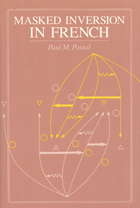
This analysis has significant consequences for contemporary syntactic theories. First, the arguments support the view that a sentence's superficial structure cannot be identified with its syntactic structure, even though such an identification is a fundamental assumption of several currently influential grammatical frameworks. Second, even certain theories that do posit abstract aspects of grammatical form fail to allow for the needed Inversion structures. Postal's study supports theories based on the notion of arc and stratification into levels which provide a natural treatment consistent with the factual requirements.
Masked Inversion in French is the first systematic account of this puzzling French syntactic anomaly, and its findings will stimulate research in many areas of natural language grammatical structure.

This expanded edition serves as a comprehensive reference guide as well as a systematic, learner-centered approach for native English-speaking students. The author addresses the most common problems of writing in French, and progresses from words to sentences to paragraphs to the elaboration of accurate and authentic expository prose.

According to the few historical records that mention Marguerite Buffet, she lived her entire life in seventeenth-century Paris where she taught French to aristocratic women. Buffet’s vivid example of proper language use in New Observations on the French Language offers a rare glimpse into the life, habits, and culture of seventeenth-century France. She describes common errors in contemporary language use and gives examples of correct expressions for speaking and writing all the while encouraging women to aspire to higher levels of intellectual achievement.
In addition, her Praises of Illustrious Learned Women, a catalog of biographies of women who displayed exemplary intellect, wit, and conversation, includes a number of the author’s contemporaries such as Anna Maria van Schurman and Madeleine de Scudéry. Buffet’s collected praises of these women, many of whom were connected to the court of Louis XIV, show her unique position as both a participant in and historian of the intellectual and social world of the French salon.
This volume presents Buffet’s work in its near entirety for the first time in English, bringing to light Buffet’s unique contribution to the centuries-long debate concerning the status of women known as the querelle des femmes.

eTextbooks are now available through VitalSource.com!
On tourne! is a one-semester, advanced French textbook (5th/6th semester of instruction) designed to be used as a stand-alone text for a course on French and francophone films or for a French conversation course. This textbook could also be used as a supplementary text in an advanced conversation course, a composition course, or a contemporary culture course. On tourne! guides students to analyze and discuss thirteen films from France and the francophone world. Each chapter focuses on a single film and includes pre-viewing activities, vocabulary, information on the cultural and linguistic nuances of the film, and post-viewing activities and discussion points. Moreover, each chapter contains a review of an essential grammatical structure as well as idiomatic expressions used in the film to highlight their pragmatic function. The films included explore a wide array of themes, ranging from family, food, and fashion to politics, religion, and racial/ethnic identities.
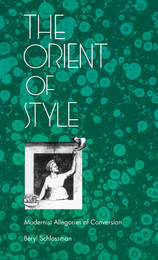
Toward the end of Remembrance of Things Past, the narrator describes the act of creating a work of art as a conversion of sensation into a spiritual equivalent. By means of such allegories of “conversion,” Schlossman shows, the modernist artist disappeared within the work of art and left behind the trace of his sublime vocation, a vocation in which he was transformed, in Schlossman’s words, “into a kind of priest kneeling at the altar of beauty before the masked divinity of representation.”
The author shows how allegory—the representation of the symbolic as something real—was adapted by modernist writers to reflect subjectivity while masking an authorial origin. She reveals how modernist allegory arose, as Walter Benjamin suggests, at the crossroads of history, sociology, economics, urban architecture, and art—providing a kind of map of capitalism—and was produced through the eyes of a melancholic gazing at a “monument of absence.”

In Poetics of Relation, Glissant turns the concrete particulars of Caribbean reality into a complex, energetic vision of a world in transformation. He sees the Antilles as enduring suffering imposed by history, yet as a place whose unique interactions will one day produce an emerging global consensus. Arguing that the writer alone can tap the unconscious of a people and apprehend its multiform culture to provide forms of memory capable of transcending "nonhistory," Glissant defines his "poetics of relation"--both aesthetic and political--as a transformative mode of history, capable of enunciating and making concrete a French-Caribbean reality with a self-defined past and future. Glissant's notions of identity as constructed in relation and not in isolation are germane not only to discussions of Caribbean creolization but also to our understanding of U.S. multiculturalism. In Glissant's view, we come to see that relation in all its senses--telling, listening, connecting, and the parallel consciousness of self and surroundings--is the key to transforming mentalities and reshaping societies.
This translation of Glissant's work preserves the resonating quality of his prose and makes the richness and ambiguities of his voice accessible to readers in English.
"The most important theoretician from the Caribbean writing today. . . . He is central not only to the burgeoning field of Caribbean studies, but also to the newly flourishing literary scene in the French West Indies." --Judith Graves Miller, University of Wisconsin, Madison
Édouard Glissant is Distinguished Professor of French at City University of New York, Graduate Center. Betsy Wing's recent translations include Lucie Aubrac's Outwitting the Gestapo (with Konrad Bieber), Didier Eribon's Michel Foucault and Hélêne Cixous's The Book of Promethea.
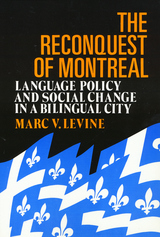
Although Montreal has been a bilingual city since 1760 and demographically dominated by French-speakers for well over a century and a quarter, it was not until the late 1960s that full-fledged challenges to the city’s English character emerged. Since then. two decades of agitation over la question linguistique as well as the enactment of three language laws have altered the places of French and English in Montreal‘s schools, public administration, economy. and even commercial signs. In this book, Marc Levine examines the nature of this stunning transformation and, in particular, the role of public policy in promoting it.
The reconquest of Montreal by the French-speaking majority makes for interesting history. It includes episodes of intense conflict and occasional violence and tells the fascinating story of how an economically disadvantaged and culturally threatened linguistic community mobilized politically and used the state to redistribute group power in Canada’s second largest city. In addition, the history of Montreal’s language question offers analysts of urban politics and public policy an excellent case study of some of the central issues facing cities containing more than one major linguistic community.
After tracing the politicization of the language question in the 1960s and 1970s, Levine analyzes the impact of the three controversial language laws penacted by the Quebec provincial government between 1969 and 1977. Exhaustively researched, The Reconquest of Montreal is the definitive study of the most explosive issue in Quebec political life.
In the series Conflicts in Urban and Regional Development, edited by John R. Logan and Todd Swanstrom.


Sons et sens presents a unique cultural approach to French pronunciation for English-speaking students. Each chapter presents a new cultural topic, such as the French education system, vernacular French, and cooking in the francophone world, in order to enhance students’ pronunciation skills within the context of French and francophone culture. Phonetic explanations and rules throughout the textbook are anchored in recent research on French phonology, reflecting contemporary French as well as elements of nonstandard variation from around the francophone world. The authors' approach derives from current research on second language acquisition and pedagogy as well as contemporary research on French linguistics—especially sociolinguistics.
The textbook’s fifteen chapters include a variety of exercises on sound discrimination, rule formulation, phonetic reading and transcriptions, and conversations. The publisher's website (press,georgetown.edu) provides about 200 sound files and several video files that show how sounds are formed with the body. A teacher's edition contains additional materials, including comments and answers keyed to the student text. Perfect for third year students, Sons et sens should appeal to instructors and students of college-level pronunciation and phonetics courses and serve as a valuable reference in a variety of courses where pronunciation is of importance. The book will also interest students with some background in French who want to perfect their pronunciation on their own.

Most previous analyses of spatial prepositions have assumed that their semantic properties can be adequately explained by familiar logical and geometrical concepts. Thus, the standard view of the preposition "in" as it appears in the sentence "the ball is in the bag" postulates that it refers to the geometrical relation of inclusion. This paradigm, however, falters when faced with the contrast in acceptability between sentences such as "the bulb is in the socket" and "the bottle is in the cap." The force exerted by the "landmark" (a conceptually fixed object) on the "target" (a moveable object) is crucial in this difference: the functional notion of containment seems more operational in the use of the preposition "in" than inclusion. That is, what are taken to be the landmark and the target depend greatly on the functions these objects serve in the human scheme. This offers important clues to otherwise problematic linguistic quirks, such as why one sleeps in one's bed, while one is said to lie on one's deathbed.
While many of the examples apply in English as well as French, there are some noteworthy differences—in French one sits on a chair, but in a couch. Vandeloise convincingly argues that it is precisely this subjective element which makes a standard geometrical account unfeasible.

A timely exploration of the political uses of language and rhetoric
Camille Desmoulins, a journalist writing under the Montagnard regime of 1793-94, remarked that France’s government had replaced “the language of democracy” with “the cold poison of fear, which paralyzed thought in the bottom of people’s souls, and prevented it from pouring forth at the tribunal, or in writing.” How this happened, how the Reign of Terror reached even into the realms of thought and language, is the subject of Caroline Weber’s book, a revealing look into the paradoxical embargo on free expression that underpinned the Robespierrists’s self-proclaimed “despotism of liberty” during the French Revolution.
Weber examines Jean-Jacques Rousseau’s and the Robespierrists’s articulation of a series of initiatives designed to curtail and control the dissemination of alternative political and philosophical messages in the republic. Here Weber underscores the internal contradictions and limitations of an enterprise that promised universal freedom while oppressing particularism, and that railed against the very language that it was compelled to adopt as a principal political tool. The book then focuses on two eloquent contemporary critics of this phenomenon, Desmoulins and the Marquis de Sade, the infamous libertine author. Weber demonstrates how Desmoulins reconfigured the Montagnard regime’s rhetoric to conjure up a political system based on tolerance, not terror, and how Sade deftly parodied the Robespierrists’s brutality and hypocrisy, proposing a republic based on the ruthless elimination of dissident voices and on the unabashed celebration of despotism and bloodshed.A balanced account of how the “discourse of totality” actually restricted particular freedoms in the wake of the French Revolution, this book provides a highly original—and timely—exposition of the political uses of rhetoric and of the links between language and power.READERS
Browse our collection.
PUBLISHERS
See BiblioVault's publisher services.
STUDENT SERVICES
Files for college accessibility offices.
UChicago Accessibility Resources
home | accessibility | search | about | contact us
BiblioVault ® 2001 - 2024
The University of Chicago Press









